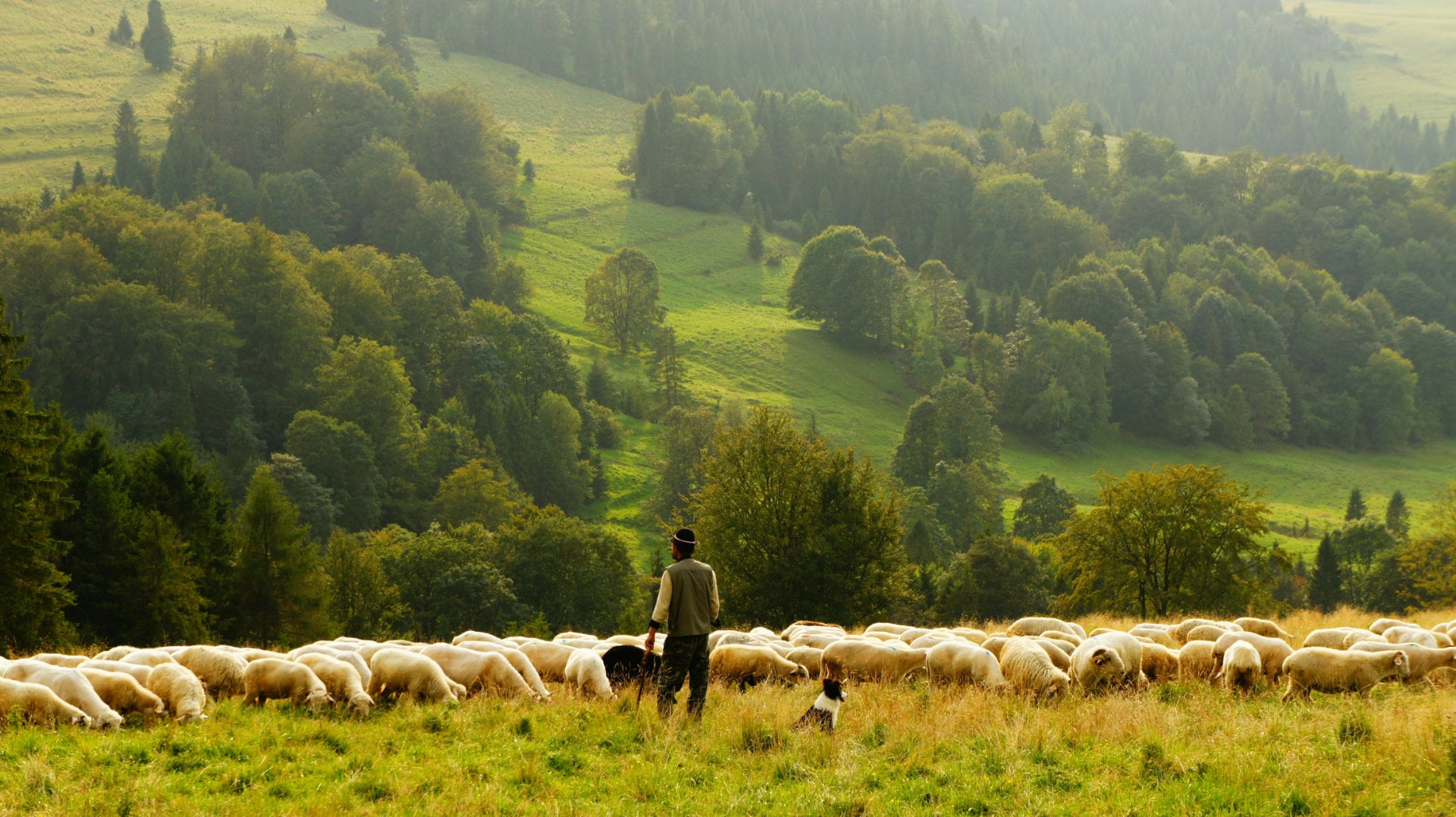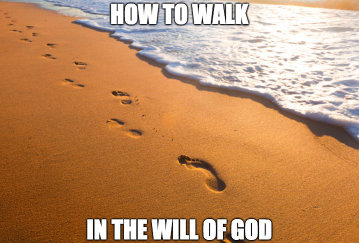
~ by John Woodward
We have been considering the profound blessings we have in Christ as our Good Shepherd (Psalm 23; John 10).
When our 98 year old church member went to be with the Lord, her funeral service bulletin contained Psalm 23. Then verse six was fulfilled in her experience: “Surely goodness and mercy shall follow me All the days of my life; And I will dwell in the house of the LORD Forever.” This Psalm is universally appreciated for its poetic beauty and devotional meaning. It portrays God’s sufficiency as described through the Shepherd’s roles as provider, leader, and protector.
1. The Good Shepherd is your faithful provider.
God promises to provide for your needed rest and refreshment: “He makes me to lie down in green pastures; He leads me beside the still waters” (Psalm 23:2). C. W. Slemming notes in his book, He Leadeth Me, that the Shepherd makes his sheep to lie down:
“Why a rest when apparently the sheep do not want one? The reason is that the shepherd can see much farther ahead than the sheep, and he has noticed a very long steep climb along a narrow and dangerous path to a mountain height … The rest, therefore, will reinvigorate, and so enable the sheep to go right through the strenuous climb … We are living in an age of rush and turmoil. Life is very hectic and its demands are very severe, we are much too busy to rest … We feel sometimes that we are indispensable and ofttimes, becoming exhausted, we ‘fall beside the way and faint.’ Even as the physical body must have periods of rest if it is to continue in a really energetic condition, so must the soul find its repose in the Lord.” [1]
Another description of provision is found in verse five: “You prepare a table before me in the presence of my enemies; You anoint my head with oil; My cup runs over.” Some commentators see in verse 5 a shift in the symbolism from a shepherd’s care to a host’s hospitality. Others interpret this verse as a continuation of the imagery of the shepherd and his sheep. Note that
- His provision is secure—the enemies are held at bay.
- His provision is refreshing—the olive oil soothed and protected the anointed one. And
- His provision is superabundant—the “cup runs over”!
Our cup “runs over” because we are “more than conquerors through Him who loved us.” “He is able to do exceeding abundantly above all we ask or think”! (Rom. 8:37; Eph. 3:20). No wonder the believer testifies, “He restores my soul” (v.3).
2. The Good Shepherd is your faithful leader.
“He leads me in the paths of righteousness For His name’s sake” (Psalm 23:3). Notice that the paths are consistent with God’s righteousness and holiness. We are led this way, not just for our interests, but for His name’s sake. The sheep’s well being is a byproduct of keeping the Shepherd first!
It is significant that the shepherd leads his sheep; he does not drive them. Mr. Slemming also noted,
“An English guide who was conducting a party of tourists through the Holy Land had made known to them the fact that shepherds always lead their sheep, when one day one of the party called the guide’s attention to a flock of sheep being driven, remarking: ‘I thought you said it was never done.’ ‘That is so’ said the guide, ‘I think we ought to inquire.’ Going across to the man, he said, ‘Excuse me, Mr. Shepherd, why are you driving your sheep? I thought it was never done?’ The man looked at him, then said, ‘Shepherd? I’m not a shepherd—I’m a butcher!’ So the exception proved the rule!”[2]
The legalist sees God driving him; the grace-oriented believer sees the Shepherd leading him. “Love for God means obedience to His commands; and His commands are not irksome” (1 John 5:3, Weymouth). “Trust in the LORD with all your heart, And lean not on your own understanding; In all your ways acknowledge Him, And He shall direct your paths”(Prov. 3:5,6).
3. The Good Shepherd is your faithful protector.
Since the sheep are basically defenseless, they depend upon the shepherd’s protection from wild animals such as the lion, bear, or snake. The shepherd’s equipment illustrates his resources for protecting the sheep. The sling, for example, was often made by the shepherd himself. It is familiar to us from the story of David slaying Goliath (1 Sam. 17). The sling was a simple devise made of a leather pouch with two long chords. It was swung in a circle over the head. When great speed was reached, one chord was released and the stone went flying. [Imagine the skill needed for the technique, timing, and aim of the sling! At least the shepherd in Israel would have had plenty of spare time and stones to develop his skill.] This weapon was also used by soldiers, such as the “seven hundred select men who were left-handed; every one could sling a stone at a hair’s breadth and not miss” (Judges 20:16). The sling was an effective weapon to strike an enemy.
When the danger was too close for the sling, the rod was used: “Your rod and Your staff, they comfort me” (v.4). This club-like weapon was potentially lethal. Thankfully for the flock, the rod was not used against the sheep; it was used to fight off enemies. Likewise, we can trust in God’s protection from our spiritual foes. The world, the flesh, and the devil are no match for the Good Shepherd. “The LORD is my light and my salvation; Whom shall I fear? The LORD is the strength of my life; Of whom shall I be afraid?” (Psalm 27:1).
The staff, however, was used on the sheep. This long, walking stick had a crook on one end. This was useful for guiding the sheep and rescuing wayward lambs. As followers of Christ we need His ongoing guidance and correction. The hymn writer lamented, “Prone to wander, Lord I feel it; prone to leave the God I love.” The remedy? The “staff” of God’s Word and Spirit in a surrendered heart: “Here’s my heart, Lord take and seal it; seal it for Thy courts above.” If we stray into the self-life, false teaching, or worldly values, the Good Shepherd faithfully corrects us:
“For whom the LORD loves He chastens, And scourges every son whom He receives. If you endure chastening, God deals with you as with sons; for what son is there whom a father does not chasten? But if you are without chastening, of which all have become partakers, then you are illegitimate and not sons. Furthermore, we have had human fathers who corrected us, and we paid them respect. Shall we not much more readily be in subjection to the Father of spirits and live?” (Heb. 12:6-9).
So His staff indeed comforts us.
The Shepherd’s protection is especially important when we are faced with high-risk situations: “Yea, though I walk through the valley of the shadow of death, I will fear no evil.” (Psalm 23:4). How reassuring to know that even the threat of death cannot deter God’s purpose for us. Paul had this confidence and so can we “… for I know whom I have believed and am persuaded that He is able to keep what I have committed to Him until that Day” (2 Tim. 1:12). Notice that the path includes the valley of the shadow of death. Spurgeon observed,
“‘The valley of the shadow of death,’ for death in its substance has been removed, and only the shadow of it remains. Someone has said that when there is a shadow there must be light somewhere, and so there is. Death stands by the side of the highway in which we have to travel, and the light of heaven shining upon him throws a shadow across our path; let us then rejoice that there is a light beyond. Nobody is afraid of a shadow, for a shadow cannot stop a man’s pathway even for a moment. The shadow of a dog cannot bite; the shadow of a sword cannot kill; the shadow of death cannot destroy us. Let us not, therefore, be afraid.”[3]
How can we have peace when faced with such peril? Recognize that God is always with us! “He (God) Himself has said, I will not in any way fail you nor give you up nor leave you without support. [I will] not… in any degree leave you helpless, nor forsake nor let you down, [relax My hold on you].–Assuredly not!” (Heb. 13:5, Amplified). So, with David, we find security knowing, “For You [God] are with me.”
In light of New Testament truth, God’s sufficiency for us is even more intimate. We are not only members of His flock, but spiritually united with the Shepherd (1 Cor. 6:17). Underline each verse of the Shepherd’s Psalm with the blessed assurance of our Savior’s provision, leadership, and protection.
These blessings from our Good Shepherd are not limited to our earthly life. We can claim, “For this is God, Our God forever and ever; He will be our guide Even to death” (Psalm 48:14). And, “Surely goodness and mercy shall follow me All the days of my life; And I will dwell in the house of the LORD forever” (Psalm 23:6).
Through personal faith in Christ, you can testify with King David, “The Lord is my Shepherd; I shall not want.” Let’s look to Him daily for security and fulfillment.
Notes
Part 2 of 2
[1] C. W. Slemming, He Leadeth Me, (CLC, 1942), 35-36.
[2] Ibid., p.32.
[3] Charles H. Spurgeon, Treasury of David, on Psalm 23.
Original article is here: https://gracenotebook.com/the-lord-is-my-shepherd-part-2/
Posted with permission.
Copyright 2001, 2010 © by John Woodward. Permission is granted to reprint this article for non-commercial use if author and GraceNotebook.com are credited. Unless indicated otherwise, biblical quotations are from the New King James Version, copyright © by Thomans Nelson, 1982.
Want more? Go to https://gracenotebook.com/english-publications-index/
(subscribe info is at the bottom of each article)

